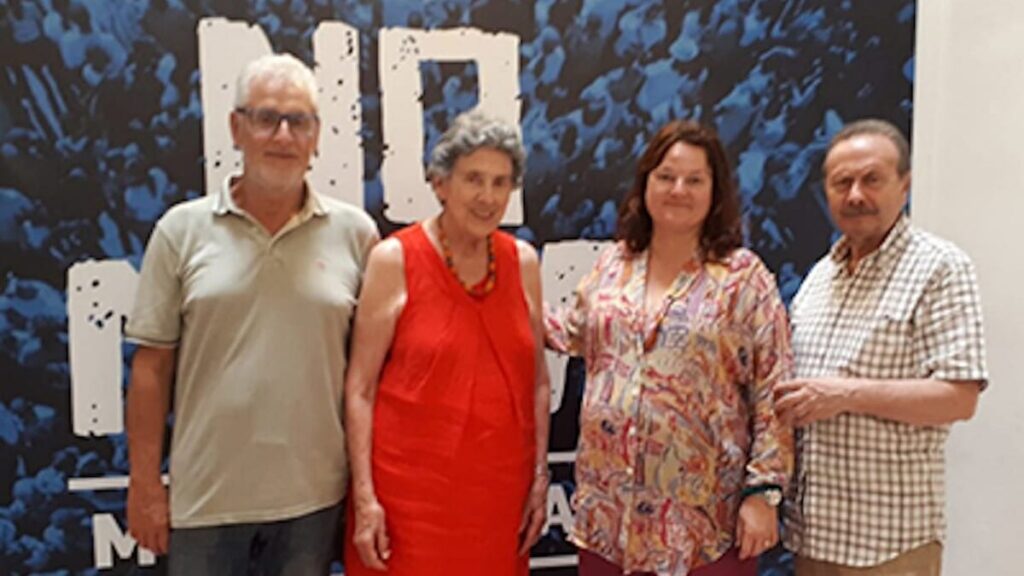NO MAFIA MEMORIAL
Since the murder of Peppino Impastato occurred on May 9, 1978 – known by the movie-public thanks to “I Cento Passi” movie – not only his mother, but also his friends Umberto Santino and Anna Puglisi have been tirelessly searching for justice and documenting the mafia. The Centro di Documentazione Giuseppe Impastato in Cinisi, founded in 1977, has been collecting material on the history of the Mafia and the anti-Mafia movement ever since.
Now the Centro has opened a museum in the heart of Palermo, in the Historical Palace of Gulì, donated by the city of Palermo. The new “No-Mafia-Memorial” hosts three permanent and one temporary exhibition and it is intended not only to give multi-media access to the topic, but also to be a place for exchange – and I can confirm, it is! To my surprise, both Umberto Santino – who is the author of many books on the Mafia – and Anna Puglisi (author of the book “Donne, Mafia e Anti-Mafia“) were there and we immediately entered into an animated conversation about the court trials, false witnesses and the Mafia in Germany.
The visit of the Museum is free of charge and in this place, like at mafianeindanke, you can see how much commitment, heart and soul it takes to do a good job with little money, based only on donations and voluntary support! Thank you, Umberto Santino, Anna Puglisi e Ario Mendiola (Art Director of the Museum), keep it going! Also mafianeindanke is working on the concept for a documentation center or better said, for an observatory on organized crime in Germany and we are looking for donors.
MONUMENTO ALLE VITTIME DELLA STRAGE DI CAPACI
We were with friends by the sea, right in front of the “Isola delle Femmine” – less than 300 meters away from the place where the Mafia carried out a serious assassination on May 23, 1992, known as the Massacre of Capaci (“Strage di Capaci”), in which the judge Giovanni Falcone, his wife Francesca Morvillo and three police escort agents, Vito Schifani, Rocco Dicillo and Antonio Montinaro, were murdered and 23 people injured. Today, right next to the motorway that connects Palermo to the airport and Trapani, there is a garden dedicated to the memory of the victims of the Mafia. There, next to a high stele, old and young olive trees grow, and each tree is dedicated to a victim of the Mafia attacks. A forest of olive trees.
There we met a man who removed garbage. A volunteer, a visitor from Rome, who was also on holiday in Sicily. We took the son of our friends there with us, an 11-year-old Italian-German from Berlin. He knows about the terroristic attack and he knows the details as every Italian does: the Strage di Capaci has a similar weight for Italians as the attack on the Twin Towers in the USA has. Everyone knows where he was in that special moment. And since then, everything has changed. Almost all today’s anti-mafia initiatives in Italy have their origin or their founding motivation from that very summer of 1992. It is always important to remember, even as a German, how many innocent victims of the mafia there are. Not only in Italy but also in Malta, Slovakia and Germany, it is too easy to think that all the people murdered by the mafia are Mafiosi killed in some mafia wars. But that is wrong. Behind every Mafia Euro laundered in Germany there are innocent victims.
ADDIOPIZZO
Mafianeindanke’s partner Addiopizzo was born 15 years ago, and the founders joined the growing anti-mafia-movement after the Strage di Capaci and the Strage di Via d’Amelio, which took place less than 6 weeks later and in which the judge Paolo Borsellino was murdered. When those youngsters wrote their business plan for the opening of a restaurant, they were reminded by their advisor that a certain percentage of money had to be planned for the “Pizzo” – an injustice that they couldn’t bear! So shameful that the founders decided to surprise the whole city of Palermo with a nightly action, putting stickers in mourning announcements that said: “An entire community who pays the Pizzo is a community without dignity”.
The Palermitans felt insulted and outraged by that message, the press got excited and hectic, searching for the authors of the sticker. After the founders of Addiopizzo declared publicly their intention of creating a network of commercial activities not paying the Pizzo, they started first collecting thousands of signatures from citizens who agreed to shop in places that explicitly didn’t pay the Pizzo, to eat in pizzerias and restaurants that went against the mafia. Only after having collected the signatures of several thousand potential customers they went to restaurant owners and other business holders with this list to get their approval to found an association of commercial activities that refused to pay. Even today, 15 years and 10,000 members later, Addiopizzo organizes an annual fair where suppliers and customers can get to know each other directly. In the meantime, the Comitato has also founded a travel agency, Addiopizzotravel, which offers free travel through the beautiful Sicily, as well as half-day anti-mafia tours, which can be booked directly, but also through various portals.
Mafianeindanke is often asked, what can a German do against the Mafia? Well, for example, to take part in these kind of travels to Sicily and support all those who said no to the mafia. By the way; there are still places available for the trip to Sicily with addiopizzo in October.
